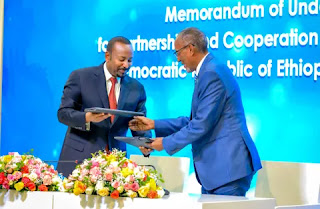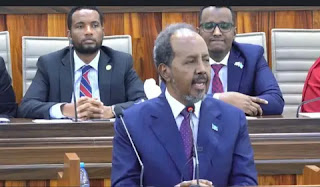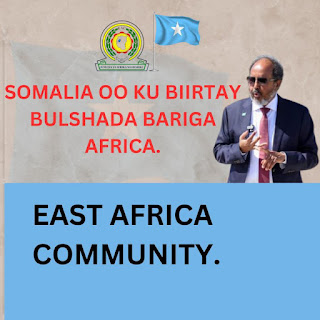WHY SOMALIA NEEDS TO JOIN EAST AFRICAN COMMUNITY (EAC): TAPPING THE UNTAPPED POTENTIAL
1.1 Introduction
The
“East
African Community (EAC) is the regional intergovernmental organisation of the Democratic Republic of Congo,
South Sudan, Burundi, Kenya, Rwanda, Tanzania, and Uganda, with its
headquarters in Arusha”, Tanzania. The aim of EAC
is creating a successful, competitive, safe, steady and diplomatically united
Eastern Africa and its Mission is to widen through augmented competitiveness,
value added production, trade and investments. The states forming the EAC formed
a customs union in 2005 and a common market in 2010. The process of regional
integration is highly developed as
shown by the encouraging advancement of the East African Customs Union and the formation
of the common market in 2010.
1.2 Why Somalia Join EAC
Somalia
has been pushing and making efforts to joining the regional bloc. Somalia
attempted joining the EAC between 2012 and 2017, though the corporation denied
the application initially, alluding this to the fact that Somalia had
intermittent conflicts and weak institutions. However, in 2022, Somalia has
renewed its interest to join the East African Community (EAC), bolstering the
desire of the current administration to stabilise ties with neighbours. On top of
strengthening ties with neighbouring countries like Kenya, Somalia wants to join EAC for the following
reasons.
1.2.1 Free movement of Somali people within EAC
Bloc
Among the major goals of EAC is to increase growth and
development in economy of the partner countries making sure that there by
facilitating the free movement of people and workers by adopting shared policies and procedures. As
per the article 104 of the EAC Treaty, “the partner states agreed to adopt measures to achieve
free movement of persons, labour and services and to ensure the enjoyment of
the right of establishment and residence of their citizens within the community”. by becoming EAC member
state, Somali people would enjoy the right of free movement between the members
countries like Kenya, Uganda, Tanzania among others without the need of having
a VISA. This would facilitate their efforts to conduct business and invest in
any country within EAC bloc without obstruction. Moreover, since there is
harmonisation of Labour policies, this would enable Somali people to apply for
jobs within the community.
1.2.2 Access to Single Customs Territory
The single customs territory has been enforced
to ensure quick and fast clearance and movement of cargo along the two
corridors (Northern and Central) and the new standard gauge railway line. The SCT
enforcement have witnessed the development of essential tools, the enhancement
of IT systems for responding to the new environment of operations and the capability
of both the public and private sectors equally improved to make sure the smooth
roll-out of the single customs territory (SCT). SCT entails inter-connectivity of customs
systems for facilitating seamless information flow between stations of customs
and a system of payment for managing revenue transfers between partner
countries of EAC. Becoming a member state, Somalia would have full access to
single customs territory which would enable them to
reduce time and cost of transportation of goods from their port in Mogadishu to
various ports within the region like that of Tanzania and Kenya.
1.2.3 Getting Insights on Laws and Policy Making
Since
Somalia is still a growing democracy, it can borrow ideas from the EAC bloc
members who have mature democracies like Kenya on how to in state laws and good policies. Moreover, the common regulatory
regime and frameworks make sure that best practice within the regional
framework is both in place and adhered to. The market closeness “single” make
sure that good procedures are established and practiced and hence creating a
kind of unified markets.
More
specifically, Somalia might get insights on how to come up with a strong
employment law. Employment
law controls the association amongst the employers and staff. It directs
what employers could anticipate from employees, what employers could command employees
to do, and rights of employees at work. With a strong employment law that
protects workers from wrongdoing by their employers, Somalia would stand a
chance to attract more competent employees from neighbouring countries.
1.2.4 Improved Market for their Products
EAC
offers a chance for member countries to have access to regional markets and
trade within the members. Contained in the common market of EAC are operational
principles of the partner states including: “Non-discrimination
of nationals of other Partner States on grounds of nationality; Equal treatment
to nationals of other Partner States; Ensure transparency in matters concerning
the other Partner States; and Share information for the smooth implementation
of the Protocol”. Somalia would benefit immensely from
joining the EAC as it will allow them to effectively export their products to
the neighbouring countries who are members of EAC. This would assist in growing
their economy.
1.2.5 Attract Foreign Direct Investment
Foreign “direct investment (FDI) is a purchase of an interest
in a company by a company or an investor located outside its borders”. The partner countries of EAC continues promoting
opportunities of investment to attract foreign direct investments (FDIs) into
the different priority sectors. The partner countries
of EAC
are committed to enhancing their economic environment
with beset investments into infrastructure, industrial development, and
oil production and refinery and investment in renewable energy, for reduction
of the huge import bills and reliance on fossil fuels. The inflows of FDIs to
the EAC have formerly been concerted in the manufacturing, construction, and
services sectors. China and India continue to be the major sources of foreign
direct investment to Eastern African Community. If Somalia succeeds in their
quest to become a member of EAC, they would be assisted in promoting and
attracting more foreign investors into the country. This would enable the
existing companies in the country establish working partnerships with large
companies in neighbouring countries like Kenya. This would go a long way in
improving the GDP of Somalia.
1.3 Conclusion
There have been numerous attempts
since 2011 by Somalia to join EAC. Though they are yet to be admitted as
members, there is still hope and Somalia needs to continue making applications.
This is because joining EAC comes with a lot of benefits both in terms of
improved international relations and economic benefits. There are various conditions that countries need to
satisfy to become members of the EAC bloc that were set out in the 1999 Treaty
for the formation of the East African Community. Hence, Somalia needs to
enhance respect for universal principles of good governance, democracy, the
rule of law, respect for human rights and other civil rights. Somalia also
needs to strengthen its institutions
and come up with more strategies to stabilise the country. There is also need
for Somalia to increase its
efforts in enhancing security and community reconciliation across the
country. This because after becoming a member state, Somalia would have full
access to single customs territory hence it will reduce time and cost of transporting goods from Dar
es Salaam and Mombasa ports.
In addition, becoming EAC member state would enable the Somali people to enjoy
the right of free movement between the member countries such as Kenya, Uganda,
Tanzania among others without the need of having a VISA. This would facilitate
their efforts to conduct business and invest in any country within EAC bloc
without obstruction.
References
1.
Katembo, B. (2008). Pan
Africanism and Development: The East African Community Model. Journal of Pan African Studies, 2(4).
2.
Kiprota, S. J.
(2012). The East African Community
(EAC) achievements and challenges since 2001 (Master's thesis, University
of Cape Town).
4.
Bagenstos, S. R. (2013).
Employment law and social equality. Mich.
L. Rev., 112, 225.
5.
Clegg, J., & Voss, H.
(2012). Chinese overseas direct
investment in the European Union. London: Europe China Research and Advice
Network
By
Abdullahi Mohodin Hassan ( Abdullahi Yabarow)
LLM
Siigaale1@




Comments
Post a Comment